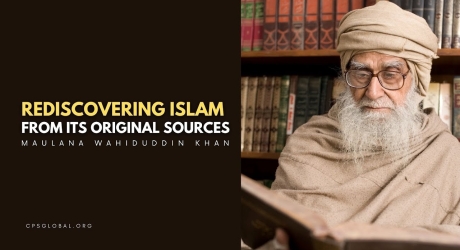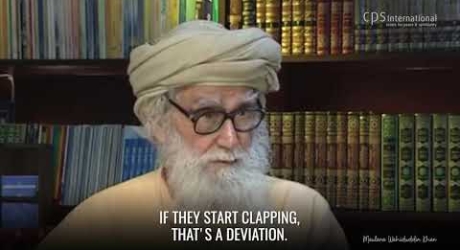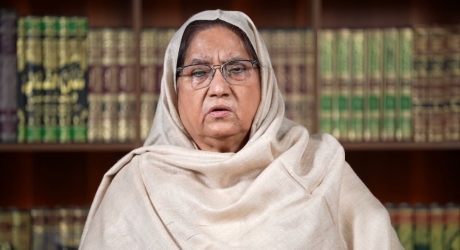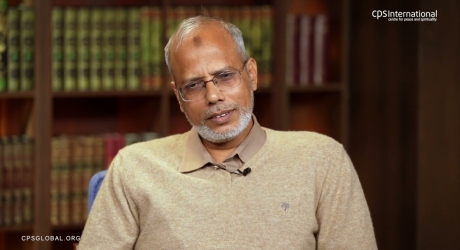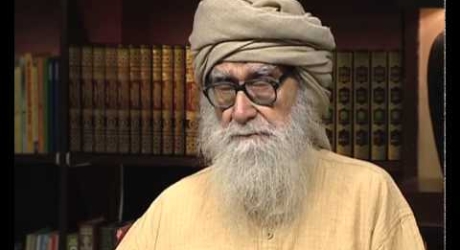In today’s age is there a need to redefine or re-apply religion?
Yes. But redefinition does not mean revision. Redefinition means describing the old teachings in the modern idiom. That is, reapplying religious values to the new lifestyle.
Introduction
Islam is considered to be a misfit in today’s scientific age. The reason given in support of such belief is that since Islam came in the traditional period, it is no longer applicable in this new age. In fact modern-day Muslims manifest this mentality themselves - those among them who receive modern education either distance themselves from Islam or Islam to them remains the name of a mere source of certain rituals that holds no importance in their daily lives.
Instead of imbibing Islamic teachings in their lives, Muslims have reduced Islam to the position of being a mere appendix. The biggest disadvantage of such a practice is that it has led to the development of a dual personality in the Muslims. That is, in the material world (for example, in their offices) they think practically but when it comes to religion they adopt a ritualistic approach. They read Namaz but the mindset and actions of these Muslims is not in consonance with what Islam seeks.
This degradation of Islam can be attributed to the failure of Muslim scholars to redefine Islamic teachings with the changing times. According to an Islamic principle, changing times cause a change in the commandments (aihkam) of Islam. Scholars applied this principle on small or non-basic issues (juziyyat), for example, if a man is healthy he will perform vuzoo (wet ablutions) and if he is sick he would be allowed to do tayam’mum (dry ablutions). However, this crucial principle was not applied on bigger or basic issues. Though some Muslim scholars (like Sir Syed) made an attempt to present Islam to the modern world, they did not succeed because they were not proficient enough to perform this gargantuan task.
Some others also tried to present their solutions to present Islam in the modern idiom but their ideas remained unacceptable to the ulema. For example, in his book the Spirit of Islam, Ameer Ali wrote that certain principles of Islam are old or applicable only in traditional age and hence need to be dispensed with. This book was an apology and was hence not acceptable to the Ulema because offering such apologies about the text rendered the eternity of Islam doubtful. Another famous scholar wrote a book in Arabic whose title translated into English is: There is blasphemy but no Abu Bakr. Some Muslims responded to the book by arousing fatwa activism and some others responded by proliferating gun activism, but it was of no avail. Yet another scholar Faizi said, “Islam requires revision.” But, the Ulema could not agree to this as it amounted to creating amendments in Islam, which was unacceptable. A man from Lahore even went to the extent of saying, “The Quran needs to be re-revealed today.” Re-revelation also was also not the right word. The right word is redefinition.
What does re-definition mean?
Redefinition means to explain the original concept in a new terminology. This practice is not new to Islam and has happened at several instances in the previous Islamic history. However, the present ulema never took up the task of redefining Islam and hence made it redundant for all practical purposes.
An Example
According to the Quran, Nemrud was the contemporary king of Prophet Abraham. When Prophet Abraham presented before Nemrud the message of Oneness of God, he said to the king,
“My Lord is the One who gives life and brings death.” Nemrud answered, “I [too] give life and bring death!” Abraham said, “God brings up the sun from the east, so bring it up yourself from the west.” (2:258)
This argument was understandable during the traditional period when people believed in the geocentric theory. However, today man has become aware of the heliocentric theory and also knows that the sun does not actually rise or set. Hence the above argument of Prophet Abraham is rendered insufficient to address the mind of modern man unless redefined in present context, bringing forth the fact that God has created the solar system in a particular fashion and no one has the power to alter the laws governing the solar system.
Price of the mistake
The price for not applying the principle of redefinition in Islam is that it has led the modern day man to believe that Islam is no longer a relevant religion. All this in spite of the fact that re-definition as a principle always existed in Islam.
Examples from Islamic History
Prophet Joseph (Yusuf)
Prophet Joseph was born in Cana, Palestine, in a family of Prophets. Since his childhood, Prophet Joseph was taught about tawheed (monotheism). Due to certain events during the course of his life, he reached Egypt, which was ruled by a dynasty of Hyksos Kings who practiced polytheism.
It so happened that the King offered the very crucial ministry of food and agriculture (as the entire economy relied on it) to Prophet Joseph. It becomes pertinent to understand the reason for the affirmative decision taken by Prophet Joseph of accepting the offer of the king. All along his life, the principle of monotheism had been taught to Prophet Joseph. He had been taught that there can be no compromise on this principle in any situation. He however neither raised a coup nor hatched any conspiracy to dethrone the polytheistic king because doing so would have jeopardised the environment of peace. Prophet Joseph therefore redefined the principle which he had learnt from the family that shirk is not the truth. He accepted the ministry under the king instead of challenging the political power or trying to unseat the king.
Prophet Muhammad
The original edifice of Kabah as constructed by Prophet Abraham was rectangular. This however got destroyed due to a natural calamity and the present structure – a cube – was built by non-believers. According to a tradition in Al-Bukhari, after Mecca came within the fold of Islam, Prophet Muhammad (while in conversation with Ayesha), once expressed his desire to re-construct the Kabah on its original base.
Ayesha asked him what stopped him from doing so and he replied that people might react belligerently to such an act as it had become a sacred place. The Prophet, therefore, refrained from doing so. This was also a case of redefinition, as the Prophet of Islam accepted the base laid down by the non-believers and did not make an attempt to rebuild it.
Companions of Prophet Muhammad
Once Prophet Muhammad sent a group of his Companions to the tribe of Banu Kurayza. Before they left the Prophet advised that they should read the Asr Namaz after reaching Banu Kurayza. While still on their way, the Companions realized that the sun was about set and the time of the prayer was passing by. They began debating whether to offer the prayer or not. Some were of the view that Prophet Muhammad did not literally mean so when he asked to read the prayer only after reaching the destination. But there were some others who were not ready to relent. Eventually only some Companions read Asr Namaz on the way and others read only after reaching Banu Kurayza, though the sun had set by then. The Ulema are of the opinion that the Companions who read their prayer during the journey were correct in doing so (Al-Bukhari). This is because the Companions had left after Zuhr Namaz and the Prophet wanted them to reach as early as possible. Indicating the urgency to reach the destination, he had asked the Companions to read the Asr Namaz after reaching Banu Kurayza. Those who read the Namaz on their way had redefined what the Prophet said rather than taking it literally.
Example from the Quran
The following verse of the Quran refers to Qital,
“Fight them until there is no more religious persecution.” (8:39)
This verse was revealed in the age of religious persecution. It was an age where mere acceptance of any other religion subjected its practitioners to severe forms of persecution. Today however, we live in the age of religious freedom; everyone is free to practice their religion.
In this age, there is no need to do qital as the supreme concern of Islam is dawah and today all roads to do dawah work are open. Ulema are of the view that Qital is not to be done for the sake of doing it. It was only applicable for that age when religious persecution was at its acme. Citing the situation prevalent during the days of religious persecution, a tradition in Ibn Hisham narrates how at the time of Prophet Muhammad even praying in open was not possible. Once Hazarat Abu Bakr was found offering Namaz in the Kabah by the non-believers and he was beaten up brutally for this. This is no longer the situation today.
Today we enjoy complete freedom. We can do whatever we want; the only unlawful act is violence. There is background to the principle of qital in Islam and when this background is not present qital is not allowed. In present times therefore, qital has become a suspended commandment and it will remain so till the same old situation of religious persecution arises. This is redefinition.
Present scenario
We find that even in Muslim countries, coups and conspiracies are being hatched to overthrow those who are ruling. People who are tirelessly give themselves for such issues are ignorant of a very important principle of Islam according to which believers must adopt status-quoism in political matters and undertake only dawah activism.
A revolutionary idea that changed the political equation in the world was democracy. Due their unawareness, Ulema declared democracy as being haram in Islam. When in reality, democracy was perfectly in agreement with the principles of Islam. Throughout history, an endless struggle for power remained a chief cause for strife among people and nations. Democracy for the first time brought an end to such a political system by proposing the rule of majority. Whereas earlier political power rested in the hands of a dynasty, today it lay with the majority of a nation, if you have the majority you can form the government. This is the power-sharing system of democracy.
The age of empire had no nationalism. Muslim Jurisprudence (Fiqh) developed during the Abbasid rule and therefore became a mere reflection of the age when Muslims ruled. For example, during the Abbasid period when the Muslims had an empire, the concepts of dar-ul-kufr and dar-ul-islam emerged. These concepts are not present in the Quran. The Quran uses a universal phrase, “O! Man” and therefore the world is Darul Insaan. The concepts of dar-ul-kufr and dar-ul-islam became misfit in the present age. Even the word Caliphate or Caliph is a product of history and not a product of Islam. In Islam the Caliphs were called amir-ul-mominun and were only administrators.
Conclusion
Re-definition required re-application of the teachings in the modern-day context but Muslims were so shrouded in the traditional interpretations that they could not look beyond them. A chief reason for this was the widespread criticism by the Muslim leaders of the modern education bought by the British. Instead of taking it as an intellectual challenge and presenting Islam in the modern idiom, Muslims stood against it. The paucity of intellectual stimulus took away the conviction from the minds of Muslims and this rendered Islam to the position of being an appendix. All this happened because Ulema failed to redefine religion.
The need of the hour is to redefine Islam. Not doing so has resulted in Muslims becoming a violent community that has developed hate for all. This is manifested in various forms of violence – passive (negative thinking) in case of some and active (gun & bomb) in case of others. In such a scenario, the biggest casualty is dawah. Dawah can be done only when one loves another human being and is his true well-wisher. This is the starting point.
Muslims world wide must change their outlook and see the world today as being Darul-faras (Home of opportunities). These opportunities are for them to avail to their benefit because negativity can only make matters worse.
I therefore implore all of you to explore this world of unlimited opportunities and perform dawah work to your utmost so that we may partake of the blessings of God - eternally!





